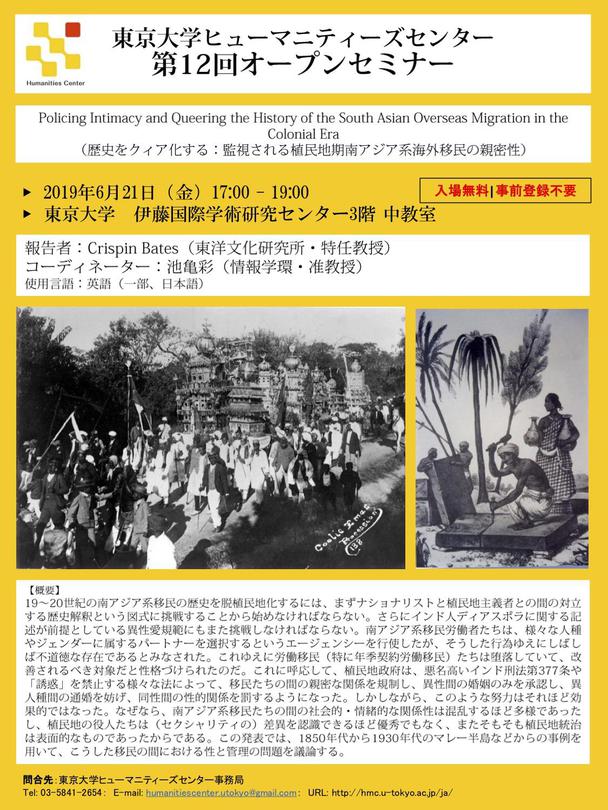Policing Intimacy and Queering the History of the South Asian Overseas Migration in the Colonial Era(歴史をクィア化する:監視される植民地期南アジア系海外移民の親密性)

- 日時:2019年6月21日(金)17:00 - 19:00(入場無料 事前登録不要)
- 場所:東京大学 伊藤国際学術研究センター3階 中教室
- 報告者:Crispin Bates(東洋文化研究所・特任教授)
- ディスカッサント:調整中(決まり次第,ホームページでお知らせします)
- コーディネーター:池亀彩(情報学環・准教授)
- 使用言語:英語(一部、日本語)
Decolonising the history of South Asian overseas migration in the nineteenth and early twentieth century must begin by challenging the dichotomous interpretations of nationalist and colonialist interpretations. It must also challenge the ideas of heteronormativity that govern most writings on the Indian diaspora. Thus, South Asian migrant workers in the colonial were often typified as immoral in their behaviour for exercising agency in their choice of partners by race and gender. This was one way in labour migration (especially indentured migration) was characterised as corrupt and in need of reform. In response, colonial governments were persuaded to regulate intimate relations amongst migrants, to uphold recognised forms of heterosexual marriage, to discourage miscegenation, and to penalise same-sex relationships, most notoriously through use of section 377 of the Indian penal code and through laws against 'enticement'. However, these efforts were often ineffective, being confounded by the diversity of social and affective relationships amongst South Asian migrants, the inability of officials to recognise the possibilities of difference, and the superficiality of colonial control. This paper examines these issues using examples taken from the Malayan peninsula and elsewhere around the Indian ocean region in the period from 1850 to 1930. (19−20世紀の南アジア系移民の歴史を脱植民地化するには、まずナショナリストと植民地主義者との間の対立する歴史解釈という図式に挑戦することから始めなければならない。さらにインド人ディアスポラに関する記述が前提としている異性愛規範にもまた挑戦しなければならない。南アジア系移民労働者たちは、様々な人種やジェンダーに属するパートナーを選択するというエージェンシーを行使したが、そうした行為ゆえにしばしば不道徳な存在であるとみなされた。これゆえに労働移民(特に年季契約労働移民)たちは堕落していて、改善されるべき対象だと性格づけられたのだ。これに呼応して、植民地政府は、悪名高いインド刑法第377条や「誘惑」を禁止する様々な法によって、移民たちの間の親密な関係を規制し、異性間の婚姻のみを承認し、異人種間の通婚を妨げ、同性間の性的関係を罰するようになった。しかしながら、このような努力はそれほど効果的ではなった。なぜなら、南アジア系移民たちの間の社会的・情緒的な関係性は混乱するほど多様であったし、植民地の役人たちは(セクシャリティの)差異を認識できるほど優秀でもなく、またそもそも植民地統治は表面的なものであったからである。この発表では、1850年代から1930年代のマレー半島などからの事例を用いて、こうした移民の間における性と管理の問題を議論する。)


